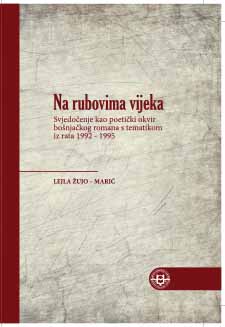Na rubovima vijeka : svjedočenje kao poetički okvir bošnjačkog romana s tematikom iz rata (1992 - 1995)
On the Edges of the Century: Testimony as a poetic framework of a Bosniak novel with themes from the 1992-1995 war
Author(s): Lejla Žujo-Marić
Subject(s): Language and Literature Studies, Studies of Literature, Bosnian Literature, Wars in Jugoslavia
Published by: Fakultet humanističkih nauka, Univerzitet »Džemal Bijedić« u Mostaru
Keywords: war in Bosnia and Herzegovina 1992 – 1995; Bosniak writers; novels; testimony; historical and moral witness; trauma; remembrance; intertextuality;
Summary/Abstract: The book deals with the issue of witnessing war and remembering war trauma in a Bosniak novel with a theme from the 1992-1995 war showing the perspective of a victim/witness of a difficult historical moment such as war. Writers and their works included in this research, apart from fictional ones, carry important historical values: writers are historical witnesses and victims, and their works are resistance to all forms of war devastation. The research focus includes the following novels published in the period 1995 - 2005: Dževad Karahasan's Night Council and Sara and Serafina, Jasmine Musabegović's Women.Voices, Nedžad Ibrišimović's Book by Adem Kahriman, Zilhad Ključan's Šehid, Nermina Kurspahić's Disappearance of the Blue Riders, Irfan Horozović's Similar Man. The research is divided into three thematic parts based on the concepts of the theory of testimony and the theory of memory: the first part deals with postulating the figure of the witness in the mentioned novels, recognizing its ethical values. An important segment in shaping the figure of a moral witness is the identification in the historical experience of ancestors and the community of the dead. The second part of the book goes into the factual places where the writers and their characters move, portraying how literary testimony is recorded in places such as Vijećnica (National Library), the Sarajevo Rescue Tunnel, Ferhadija, city spaces under siege such as Sarajevo, Mostar, Banja Luka also shaping the space of exile. All spaces, except real ones, carry symbolic values. The third part of the book opens questions about the possibility of the literary text as a space of authentic witnessing, starting from the terms such as Bakhtin's polyphony, and dialogicity from which intertextuality emerges as an artistic place of articulating war trauma and historical experience. In the intertextual key, the relationship of the small story to the big ones constructed over time in different forms of culture such as religion, history and literature is questioned. All the novels portray war as a horror, calling for dialogue, humanism and preservation of memory and remembrance.
- Print-ISBN-13: 978-9926-434-51-9
- Page Count: 322
- Publication Year: 2021
- Language: Bosnian
- eBook-PDF
- Table of Content
- Introduction

